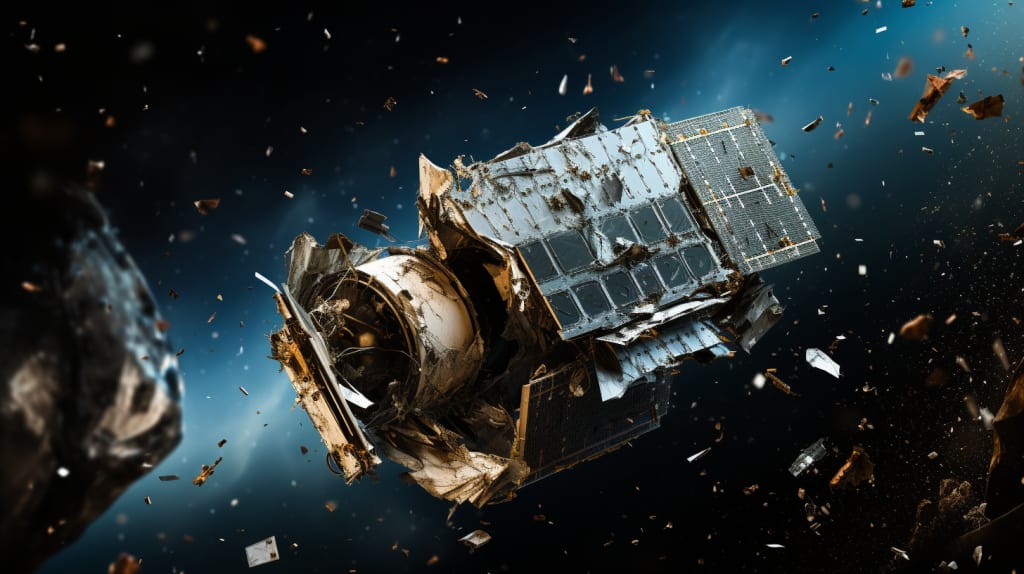
Introduction
As space exploration and satellite deployments increase, so does the amount of space debris orbiting our planet. Space debris, also known as space junk, poses a significant and often overlooked challenge to space exploration and satellite operations. This article aims to shed light on the issue of space debris, exploring its origins, potential consequences, and the critical need for space debris mitigation efforts to ensure the long-term sustainability of space activities.
The Origins of Space Debris
Space debris consists of defunct satellites, spent rocket stages, fragments from past missions, and other objects that remain in orbit around Earth. The accumulation of space debris is a result of decades of space exploration and satellite launches. Collisions, intentional and unintentional releases, and the natural decay of satellites contribute to the ever-growing population of space debris.
The Threat of Collisions and the Kessler Syndrome
The presence of space debris poses a significant threat to operational satellites and spacecraft. Even small debris fragments can cause substantial damage due to their high velocities. The risk of collisions between active satellites and space debris is a concern, as it can lead to mission failure, satellite destruction, and the creation of additional debris. The Kessler Syndrome, a theoretical scenario proposed by NASA scientist Donald Kessler, describes a cascade effect where one collision generates more debris, leading to a chain reaction that renders certain orbits unusable.
Impact on Satellite Operations and Spacecraft Safety
Space debris poses a threat to satellite operations and the safety of astronauts aboard the International Space Station (ISS). Active satellites and spacecraft must continually track and maneuver to avoid potential collisions with space debris. The presence of debris increases the risk of damage to critical components, such as solar panels and communication systems. For the ISS, regular debris tracking and maneuvers are necessary to ensure the safety of its crew.
Space Debris Tracking and Monitoring
Space agencies and organizations around the world monitor and track space debris using ground-based radars and telescopes. These tracking systems provide valuable data on the location, size, and trajectory of space debris. The information helps predict potential collisions and allows satellite operators to take preventive measures to safeguard their assets. However, tracking and monitoring capabilities need to be further enhanced to effectively manage the growing population of space debris.
Space Debris Mitigation Strategies
Space debris mitigation aims to prevent the creation of new debris and reduce the existing population. Various strategies have been proposed, including designing satellites for controlled re-entry, deploying active debris removal missions, and implementing guidelines for satellite operators to minimize space debris during satellite launches and operations. Adherence to international guidelines, such as those provided by the Inter-Agency Space Debris Coordination Committee (IADC), plays a crucial role in promoting responsible space activities.
Long-Term Solutions: Space Debris Removal and Cleanup
The removal and cleanup of existing space debris are essential for maintaining sustainable space activities. Active debris removal (ADR) missions involve capturing and removing debris from orbit. Proposed ADR techniques include robotic arms, nets, harpoons, and ion beams. While these technologies show promise, significant technological and logistical challenges remain, and international collaboration is crucial to address these challenges effectively.
The Role of International Cooperation and Policies
Addressing the challenge of space debris requires global cooperation and the development of international policies. Spacefaring nations, space agencies, and private entities must collaborate to establish clear guidelines for space debris mitigation, promote best practices, and share data and technologies. International agreements, such as the United Nations Space Debris Mitigation Guidelines, provide a framework for cooperation and coordination in managing space debris.
The Future of Space Exploration and Space Debris Mitigation
Space debris mitigation efforts are crucial to ensuring the long-term sustainability of space exploration and satellite operations. As the number of satellites and space activities continues to rise, the risk of collisions and the generation of new debris increases. Continued investment in technology development, international cooperation, and the adoption of responsible practices by all stakeholders will be vital to effectively address the space debris challenge and safeguard the future of space exploration.
Conclusion
Space debris presents a hidden but significant challenge to space exploration and satellite operations. Without effective mitigation efforts, the increasing population of space debris poses risks to operational satellites, the International Space Station, and the sustainability of space activities. By investing in space debris tracking, adopting responsible practices, and exploring active debris removal technologies, we can mitigate the risks associated with space debris and pave the way for a safer and more sustainable future in space exploration.
About the Creator
Tatsuki
Space, Quantitative Finance, Crypto, Blockchain, Langurages, etc.
Personal Blog (Japanese): https://www.jinsei-100nenn.com/
AI Art Project: Space Cat AI (on Instagram)
Follow me:






Comments
There are no comments for this story
Be the first to respond and start the conversation.